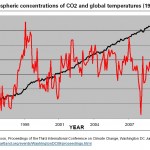climate change
Some old news here and some new, all of it about my favorite climate contrarian, Lord Cristopher Monkton. He is my favorite because he is a clown and the more he is put forth as denialism's "Septical Champion" the better.
First the old news. You may recall Tim Lambert debated Cristopher Monckton in Sydney a couple of months ago. Well that debate is up on YouTube in full. It is a 15 part playlist, but Tim tells us his presentation is part 3 and 4. I watched most of it and it is worth the time.
I think it is kind of amusing, and revealing, that Monkton claims some rather intimate knowledge…
Most of the alarmism generated by climate predictions deals with sea level rise, drought, and biodiversity loss. But what happens to waterfront property, farms and polar bears could be the least of our worries if temperatures rise much more than a few degrees. A new paper in PNAS, "An adaptability limit to climate change due to heat stress," paints a much more dire future for much of the larger mammals on the planet, including humans.
In the paper, Steven Sherwood of the University of New South Wales and Matthew Huber of Purdue University try to estimate how warm the Earth can get before…
Again, Stuart Staniford runs the numbers and clarifies the analysis, and comes up with some really hideously bad possibilities. In his "Odds of Cooking the Grandchildren" Staniford shows us the implications of a PNAS paper that I'd missed:
There is a horrible paper in this week's Proceedings of the National Academy of Sciences (hat-tip Desdemona Despair), which looks at how the limits of human physiology interact with upper-range global warming scenarios. The bottom line conclusion is that there is a small - of order 5% - risk of global warming creating a situation in which a large fraction…
Science has published a letter with 250 signatories protesting the recent and extreme attacks on scientists, climate scientists in particular. I agree with Michael, this letter should not be behind a paywall. I think the fact that it is, is disturbingly revealing of the disadvantage science has in the PR arenas.
It is very well done, though to be honest I wish they had not pushed the creationist button and had instead used an entirely different example of well established science to make their point. As scientifically non-controvesial as the age of the earth is, we need to reach even those…
There's a letter in today's Science from 255 members of the National Academy of Sciences that deserves to be read:
Climate Change and the Integrity of Science
We are deeply disturbed by the recent escalation of political assaults on scientists in general and on climate scientists in particular. All citizens should understand some basic scientific facts. There is always some uncertainty associated with scientific conclusions; science never absolutely proves anything. When someone says that society should wait until scientists are absolutely certain before taking any action, it is the…
tags: How we Wrecked the Ocean, oceans, fish, fishing industry, introduced species, biological pollution, chemical pollution, climate change, coral bleaching, Jeremy Jackson, TEDTalks, TED Talks, streaming video
In this bracing talk, coral reef ecologist Jeremy Jackson lays out the shocking state of the ocean today: overfished, overheated, polluted, with indicators that things will get much worse. Astonishing photos and stats make the case. So in a nutshell: we've wrecked everything around us: the water, the air, the animals, the climate, and any illusion of world peace we ever had. We're…
A regular here recently offered us this PDF from Willie Soon and Lord Monkton's Science and Public Policy Institute and asks what is wrong with the graph in there.
As it happens, Michael Tobis has already taken a look at another very similar construction and identified three deceptions (he kindly called "bugs") in what is technically correct data.
different smoothing is used on the two types of data. Temperature is presented in monthly mean whereas CO2 looks to have had the seasonal rise and fall removed. This gives the impression of a steady rise in CO2 in stark contrast to the jitters…
Logging the Onset of The Bottleneck Years
This weekly posting is brought to you courtesy of H. E. Taylor. Happy reading, I hope you enjoy this week's Global Warming news roundup
skip to bottom Another week of Climate Instability News Logging the Onset of The Bottleneck YearsMay 2, 2010 Chuckles, COP15, COP16, Cochabamba, SAARC, BASIC, Mediterranean 5+5, Melting Icebergs, Economists Bottom Line, Medupi, Subsidies, Aus ETS, Per-person Quotas, Post CRU, Anthropocene, Volcano, Earth Day Melting Arctic, Geopolitics, Antarctica Food Crisis, Food vs. Biofuel, Land Grabs,…
So the blogosphere has been abuzz over a recent Q&A Keith Kloor did with Judy Curry, the lengthy comment thread is where most of the interesting stuff is. I actually wish to opine on the whole sorry mess but that will be in a later post. Her biggest beef is about what she sees as "tribalism", but I only want to highlight with this post a comment on a follow up thread that really jumped out at me:
Kate says:
This is the fight that will define the twenty-first century as either a time when mankind advances due to honest enterprise, quality science, and technical achievement...or we are…
From APOD:
(click on image for full resolution, totally awesome!)
Here is an equally stuning video of that prominence erupting:
Ironic that according to the IPCC that massive ball of fire has nothing to do with the climate which is entirely controled by CO2, isn't it?
(As humour is hard to detect on the internets I had better spell it out: the IPCC makes no such ridiculous claim, that is a denialist strawman. The sun sends around 343W/m^2 our way, but the important factor is change in that number, which since around 1850 is ~0.3W/m^2 while GHG direct forcing is ~2.5W/m^2. Kinda ruins the…
April seems to have been "Beat up on Christopher Monckton" month among climate science bloggers. Why all the attention? Part of the reason is even reputable media outlets the likes of The New York Times continue to treat him as the equal of someone with genuine professional expertise in matter climatological. Also relevant is his brief candidacy for public office in the May 6 general election in the U.K. He is now just climate change spokesperson for the UK Independence Party.
I hope it's not too late to add my own thoughts. First, it matters not one whit whether Monckton is or isn't a member…
One last look at Judith Curry, before I shut down the Island of Doubt and launch my new blog tomorrow. I, and many other climateers, remain fascinated by what she has to say, largely because we've never seen a respected climatologist be so publicly critical of her peers and so tolerant of the pseudoskeptics, but also because what she's talking about goes straight to the heart of the battle.
The latest volley comes in the form a comment at Keith Kloor's Collide-a-scape blog:
The people slagging off on McIntyre, Watts et al. have probably spent no time over at their blogs or made an effort to…
Seeing as the comments function is still unavailable here, I'll continue to point y'all elsewhere. The problem will resolved by this weekend, at which time I'll resume posting more original content.
Judith's Curry's now (in)famous Q and A with Keith Kloor continues to fascinate the blogosphere. Today, Stoat provides a more detailed, and even more critical response to her take on Wegman vs. NRC reports and other controversial subjects, and Curry herself provides more insight into her evolution from a standard bearer of anthropogenic global warming into a critic of the IPCC. A…
There aren't too many working climate scientists out there arguing that the release of the University of East Anglia emails may end up being a good thing. But that seems to be what Judith Curry of the Georgia Institute of Technology is arguing. Over at Collide-a-scape, Keith Kloor has posted an email exchange with Curry, who lays out her problems with the state of climate science, the IPCC and a few individuals, ostensibly in hopes of generating some sincere soul-searching and reflection that results in improvements to both the climatology community and the way it communicates with the public…
Richard Lindzen has an op-ed in the Wall Street Journal for Earth Day and exhibits the best of climate denialism's ability to flip reality on its head. I was considering going through it and highlighting its many falsehoods and logical holes but Arthur Smith has done a fine job of it already.
The WSJ op-ed is behind a paywall, but if you click the first result in this google search, you can read it in full. Arthur's take down is here.
Renewable energy advocates like to trumpet the rapid growth rate of wind farms and solar power plants, and it's true. Installed wind capacity grew by almost 32 percent globally in 2009, according to on industry estimate. Capacity is now doubling every three years. That's a remarkable feat, considering how sluggish the world economy has been. But it's important to put such numbers in perspective.
All the wind farms in the world are capable of producing just 160 GW of electricity (let's not worry about actual production vs theoretical capacity for the moment). By comparison, the total global…
On the advent of this 40th Earth Day, nine climatologists from Germany take a look at the range of likely scenarios if we do nothing more to reduce the causes of global warming than is called for by what the world agreed to at Copenhagen last year. The bottom line:
"it is equivalent to racing towards a cliff and hoping to stop just before it."
Here's the summary, as laid out in an opinion essay in Nature (subs req'd, although with something this important, it really shouldn't be:
Nations will probably meet only the lower ends of their emissions pledges in the absence of a binding…
A number of commenters to my previous post argued that I'm being unfair to Earth Day - of course, there's greenwashing. of course people are cashing in, but underlying the greenwashing, there's something good and serious and worthwhile there and I'm being churlish to deny it.
And in some ways, I agree that both points are true - I am a little churlish about Earth Day, and there are some good things about it. For example, because Earth Day is an established "holiday," (it comes in after Mother's Day and Valentine's Day and probably before Father's Day and Groundhogs Day in minor holidays by…
A little over forty years ago, Cleveland's Cuyahoga River caught fire. It wasn't the first time the polluted waters had gone ablaze - indeed, since 1868, the river had lit up at least thirteen times. At the time, the excessive pollution of our nation's waterways was the "price of optimism," the inevitable cost of life in an increasingly urban world.
The fire that burned on June 22, 1969 had a different meaning for many others. To them, it was the Earth's cry for help. In a blaze of glory, Mother Nature was calling out to her children to do something to save her before it was too late.…
Yesterday we posted on our strong support for open access publishing of tax payer supported research. We are taxpayer supported scientists (at least our NIH grants are) and we consider our work to be the property of the public, who paid for it. Whenever possible (which is most of the time) we do publish in freely accessible journals. Making data freely accessible is more controversial, but we also support this, perhaps with a reasonable grace period to allow scientists to have priority for data they expended effort to collect and with reasonable safeguards for confidentiality and privacy when…


